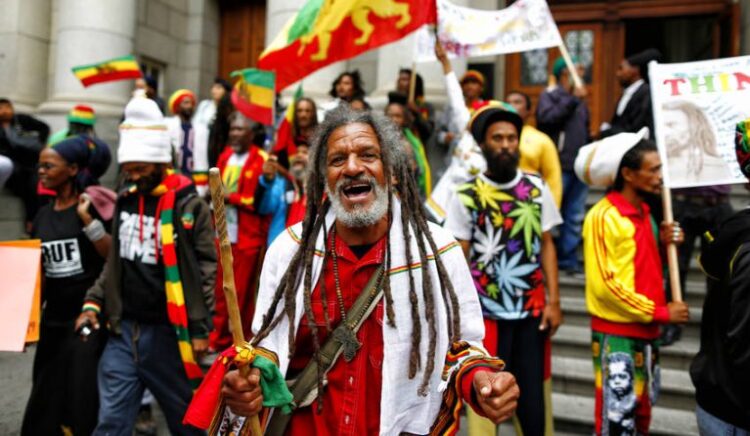You could say we’re advocates of Dank (the slang used for marijuana in SA), we’ve written different articles not to just promote the plant but also make the minds of Africans who have a traditional and predated understanding of marijuana more aware to what exactly the *drug* is and what it does. Each article has been received with different reviews but as a platform based on consciously documenting everything going on, it’s hard to deny the heavy influence of marijuana in African millennials and Generation Z.
In the spirit of celebrating our anniversary, we’ve decided to compile seven reasons why we feel marijuana should be federally Legal in Africa as a whole.
Regulation Is Too Costly
Regulating cannabis is costly and environmentally damaging with negative effects on people. For the past 10 years, Kenya’s anti-narcotics unit has conducted a vicious campaign to stop cultivation and trade of weed (or bhang). Hundreds of hectares of plantations in the Mount Kenya regions of Embu and Meru are bulldozed or put on fire each year. Despite their efforts, high demand and lack of alternative sources of income drive farmers to continue to harvest. In Zimbabwe, before the legalization of medical marijuana, possession, growing, or use of cannabis for any reason could leave you with a 12-year jail sentence. In Mauritius, an estimated 75% of prisoners are in jails for smoking marijuana. In Gabon, the penalty is six months to two years and a fine. In Nigeria, SARS (a special unit of the police force tasked to bring down drugs) has killed, harassed, and molested for possessing marijuana.
When will we stop the violence against our own people?
Medical Use
Marijuana has a lot of its medicinal properties which can treat a variety of illnesses. With a lack of medical professionals and proper healthcare facilities in rural areas, medical marijuana is an opportunity for African governments to legalize a substance that can make people’s lives a little easier especially in poor nations that can’t Afford proper medical aid and drugs. Research has shown that marijuana can help people living AIDS/HIV to eat and sleep better, experience a better mood, and even helps with neuropathic pain, depression, cancer (kills cancer cells and improves radiation treatment), chronic pain, epilepsy (reduced frequency of seizures), and glaucoma (preserve nerves that lead to blindness) and arthritis (reduces pain-causing inflammation). Weed isn’t a gateway drug if uses consciously or medically.
Good for Farmers
Africa accounts for more than 50% of the vegetative land in the world and Weed is estimated to be a 10 billion dollar business which means a lot of Farmers across Africa will benefit heavily if they begin Weed Farming. From an agricultural perspective, cannabis is just easier to grow and more lucrative than other crops such as maize and sugarcane. Weed farming is an important cash crop in places like the rural Eastern Cape.
African Countries Should Keep Up
It’s already legal in other parts of the world, there’s no need for the African continent to carry last (Like we always fucking do). Over the past decade, Medical & Recreational Weed is becoming legal in most states across the United States cause they’ve begun to understand not only the benefits but the importance of having this crop legal. A bi-partisan bill proposing the legalization on a federal level currently being pitched in Europe and South America. The financial impact of marijuana sales is helping grow their economies: cannabis sales make up for 0.64% of Lativa’s GDP, 0.47% of Australia’s, 1.45% of Czech Republic’s, 0.36% of Slovenia’s, and it makes up 0.34% of GDP of New Zealand.
Good for Economy
The weed market has the potential to do to the African economy what it’s already doing in other continents across the globe. CNN sites a UN Survey which states more than 10,000 tons of cannabis are produced on the continent of Africa each year. Based on a rapidly expanding global market for legal weed, leading advocates estimate a potential billion dollar industry in Africa. Not only does this give room for opportunity to stimulate the economy, it can prove to be a unique way for the government and independent farmers to work together. Importantly, it can help reduce unemployment in women (as they are reportedly the biggest dealers in Africa), and young people. With a growing youth population, many of whom are jobless, legalization can help reduce violence and civil unrest.
Did you know it was already legal in some African countries?
A few of African countries have seen the light and joined the “green wave”, despite major pushback. Zimbabwe recently legalized the growing and use of cannabis for scientific and medicinal use.
- Zimbabwe: They’ve recently legalized the growing and use of cannabis for scientific and medicinal use.
- Morocco: The nation’s marijuana industry employs 800,000 people and is estimated $10 billion a year in sales.
- Ghana: The Ghana Standards Authority recently suggested that the national campaign to cultivate marijuana could generate valuable income.
- Swaziland: The Swazi House Assembly of Swaziland has appointed a committee focused on legalization research.
- South Africa: SA has taken strides and is well on its way to legalization.
Lawmakers in Africa need to catch up with the pace of the modern global market. They need to see the huge education potential for rural farmers, the potential for the alleviation of ailments in rural areas, and the potential for government institutions and unprecedented partnerships with farmers.
Fela Kuti, Bob Marley & The Future.
Fela Kuti, Bob Marley and a lot of other incredible minds have been on the substance and have gone on to change the world. In a generation with a lot of young minds (minds we call ‘a generation of Felas’), the euphoric and cerebral nature of weed will be a boost to the future thinkers, innovators, and creatives. Don’t get me wrong, we’re not saying Africa needs weed before it moves forward but it won’t be a negative either.



